初中be+形容词+介词短语总结
初中常见的含有介词的词组小结)
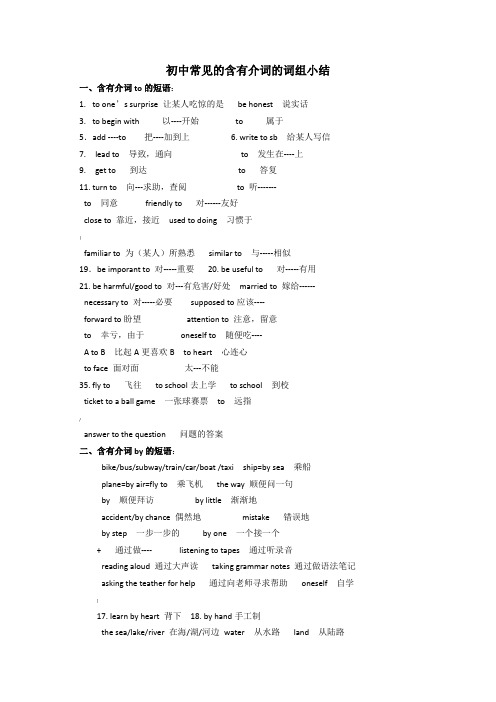
初中常见的含有介词的词组小结一、含有介词to的短语:1.to one’s surprise 让某人吃惊的是be honest 说实话3.to begin with 以----开始to 属于5.add ----to 把----加到上 6. write to sb 给某人写信7. lead to 导致,通向to 发生在----上9. get to 到达to 答复11. turn to 向---求助,查阅to 听-------to 同意friendly to 对------友好close to 靠近,接近used to doing 习惯于|familiar to 为(某人)所熟悉similar to 与-----相似19.be imporant to 对-----重要20. be useful to 对-----有用21. be harmful/good to 对---有危害/好处married to 嫁给------ necessary to 对-----必要supposed to应该----forward to盼望attention to 注意,留意to 幸亏,由于oneself to 随便吃----A toB 比起A更喜欢B to heart 心连心to face 面对面太---不能35. fly to 飞往to school去上学to school 到校ticket to a ball game 一张球赛票to 远指/answer to the question 问题的答案二、含有介词by的短语:bike/bus/subway/train/car/boat /taxi ship=by sea 乘船plane=by air=fly to 乘飞机the way 顺便问一句by 顺便拜访by little 渐渐地accident/by chance 偶然地mistake 错误地by step 一步一步的by one 一个接一个+ 通过做---- listening to tapes 通过听录音reading aloud 通过大声读taking grammar notes 通过做语法笔记asking the teather for help 通过向老师寻求帮助oneself 自学[17. learn by heart 背下18. by hand手工制the sea/lake/river 在海/湖/河边water 从水路land 从陆路a living by 以------谋生goes by. 时光飞逝the end of-----在-------结束时by 经过the time---到----时候11 o’clock 11点以前三、含有as的短语:for 至于把------视为famous as 作为-----而出名 a result 结果as 以……为职业 a volunteer 作为一名志愿者a(an)职业名称作为一名soon as 一----就^形容词/副词原级as possible 尽可能-----地same as 与----一样10. act as担当……11. as the first language a second language四、含有out的短语:out 算出out 帮助(摆脱困境)out 晚归out 清理---out 不许进入out of 用完7out of style 过时out 出版,开花out =look out 当心out the trash 倒垃圾out 查清out todinner 出去吃饭out 出去out of 由----制成out 卖完)out=give out 分发out 闲逛五、含有off的短语:off 离开off 激起off 发出声响off 中断off 起飞,脱掉off 推迟off 关闭two days off 请两天假off 炫耀六、含有over的短语:over 顺便拜访over 克服over 结束over 仔细思考over 游戏结束and there=everywhere 到处over the world=around the world 全世界and over again 一次又一次over sb 打量某人、the years 多年来(常与现在完成时连用)七、含有up的短语:up 起床up 查阅up=come up with 想出up with sb 赶上某人and down 上上下下up 混合up 张贴up 建立up 调大up 起立up 唤醒up 采摘,捡起13Hurry up 快点up 用完up 时间到up 吃完up 露面18.dress up as 装扮成up 编织,组成up 使振作起来八、常与介词about连用的短语:,A.动词+about1. hear about 听说about 谈论about 四处看about=be worried about 担心about 思考,考虑about 了解about 关心about 着手,开始+形容词+aboutcareful about 对-----担心 2. be excited about 对----兴奋nervous about 因-----而紧张angry about 为----生气anxious about 为-----焦急happy about 为----感到高兴serious about 对-----认真sure about 对----有把握九、常与介词at连用的短语::A.动词+atat 看---- at(远)指向at 敲门(窗等)at 向-----瞄准 5. shout at冲-----嚷at 嘲笑at 拜访at 到达(小地点)9. throw at朝……扔+形容词+atangry at 为-----而生气good at=do well in 擅长于bad at 不善于mad at 对------发怒amazed at 对------惊讶aimed at 针对---+名词school 在学校night 在夜晚times 有时#breakfast/lunch/dinner 在吃早饭/午饭/晚饭present 目前home 在家work 在上班table 在吃饭the table 在桌子旁college/university 在上大学the mall 在商场least 至少last 最后once 立刻the moment 此刻,现在D.其他与at连用的短语last 最后the age of 在------岁时at all 一点也不that time 那时least 至少most 最多the end of 在------末the doctor’s 在诊所the moment 现在,此刻the beginning of 在----的开始.十、常与for连用的短语:A.动词+forfor 要求得到for 等候for 关心,喜欢for 寻找for 查找for 付款for 动身去for 为-----做准备for为-----效力for要求for 用----换for 支持for代表,表示for派人去拿,召唤wish for 希望得到+形容词+forlate for 迟到famous/well-known for 因-----而出名good/bad for 对---有益/害used for 被用于--- 】ready for 为----而准备sorry for 因----而抱歉fit for合适,适当anxious for 盼望,渴望suitable for 对----合适thankful for因----而感激+名词example=for instance 例如fun 为了娱乐十一、常与from连用的短语:A.动词+from1.hear from 收到某人来信from 因----而死2.keep/stop/prevent from 阻止做---- from 向----学习come form 来自from 向----借&away from 远离from 从------摔下来from 始于----时候from 由于+形容词+fromdifferent from 与----不同far from 离----远made from 由----制成(看不出原料)away from 远离--- absent from 缺席C.其他与from连用的短语:from 在-----对面years from now=in ten years 十年以后从----到---- beginning to end 从头到尾door to door 挨家挨户time to time 不时地>now on 从今以后十二、常与介词in连用的短语:A.动词+inin 到达(大地点)in line 插队in 上交in 引进in 在---成功in 信任in=take part in 参加pride in=be proud of 为-----感到自豪in 收获in 导致in填写in 进来in the way of 妨碍common 在----有共同之处+形容词+ininterested in=take an interest in 对-----感兴趣weak in 在---方面弱)strict in sth 对某事严格experienced in 在---方面有经验honest in 在----方面诚实rich in 在----方面富有successful in 在-----成功+名词danger 处于危险之中trouble 处于麻烦之中a hurry 匆忙地 a low voice 低声地English 用英语bed (强调人)躺在床上hospital 生病住院the hospital 在医院里silence 静静地public 在公共场合the end 最后general 通常time 及时space 在太空;grammar 在语法方面the last few years 在过去几年17.i n one’s free/spare time 在某人空闲时间some waysthe future 将来future 从今以后十三、常与介词of连用的短语:A.动词+ofof 想起of 梦到of 听说of 抱怨of 谈到of 死于+形容词+ofafraid of 害怕careful of小心,留心full of =be filled with 充满sure of 肯定,对---有把握glad of 为---高兴]proud of 为---自豪made of 由----制成(看得出原料)short of 缺乏terrifed of 非常害怕tired of 对----厌烦fond of 喜欢C.其他与of连用的短语kinds of 各种各样的kind of 一种kinds of 不同种类的of 有几分,有点儿lot of/lots of 许多pair of 一副(双)care of=look after 照看,照顾sb of sth 使某人回忆起某事the beginning of 在-----开始of 而不是,代替of 由于out of 用完,耗尽fun of取笑thousands/millions of 数百/千/百万的of all 首先…small/large number of 少量/大量的number of ---的数量of interest 名胜古迹of 很多的risk/importance/dangers ----的风险/重要性/危险十四、常与介词on连用的短语A.动词+on1.call on 拜访某人on 取决,依赖于on 以----为生on 继续on 继续on 以----为生on穿上swich on 打开(电源)在----花钱on 试穿on 继续移动on 传递on 忙于on to 坚持on 加油on well…+名词duty 值班earth 究竟the earth 在地球上board 乘(车,飞机)foot 步行vacation/holiday 度假sale 廉价销售one’s way 在------的路上fire 着火the bus 在公共汽车上my way home 在我回家的路上Saturday weekends 每逢周六a cold morning 在一个寒冷的早上show=on display 展览time 按时the Internet 在网上the second floor 在第二层on 稍后the top 在顶部the one hand –on the other hand 一方面,另一方面business在出差[十五、常与介词with连用的短语A.动词+with1.deal with 处理,对付with sb 同意某人with 处理3.provide sb with sth=provide sth for sb 为某人提供某物with 玩,玩弄on/along with 与------相处with 以-----供给up with 以-----结束in love with 爱上+形容词+withangry with sb 生某人的气busy with 忙于friendly with 对-----友好strict with sb 对某人严格pleased with 对-----满意(高兴)careful with 小心&patient with sb 对某人有耐心popular with 受-----欢迎familiar with 熟悉,精通satisfied with 对----满意covered with 被-----覆盖C.其它与with连用的短语the help of=with one’s help 在某人的帮助下hands with sb 和某人握手friends with 与----交朋友sb with sth=help sb do/to do sth 帮助某人做某事faces with sb 与某人做鬼脸house with a garden 一个带花园的房子十六、常与away连用的短语1.take away 拿走away 捐赠away 扔掉`away 离开away=at once 立刻away 收拾,放好对点模拟练习一、单选will have dinner at Qianxilong Restaurant,which is famous its seafood .is standing Gina and Jim.sweater look nice,is it made Shanghai.Wang’s daughter is pretty good drawing pictures and won many prizes.,C..intrying many times,we got succeesful in the end.present first least lastYan is my best friend,she comes a small village.coat looks nice .What’s it made---Cotton,and it is made Wuhan.;in ;in ;on ;onarrived the village a snowy night.;on ;in ;at ;on(wrote my brother last Saturday,but I haven’t heard him up to now.;to ;of C,to;to ;from10. my surprise,the twins have nothing common.;in ;in ;on ;oflies the east of China and the northeast of Guangdong.;on ;in ;to ;in12. Children’s Day ,all the children are very happy.A,To13. the sun’s heat and light ,there would be no life on the earth.%your father go to work, foot or bikeusually takes the bus to work.;with ;on ;on ;by15. the money she got from her parents,she bought many books medicine. ;in ;on ;in D,With;on二、根据汉语意思完成句子。
初一英语知识点归纳

初一英语知识点总结1、动词be〔is,am,are〕的用法我〔I〕用am;你〔you〕用are;is跟着他〔he〕、她〔she〕和它〔it〕.单数名词用is,复数名词全用are.否定句中,直接在be动词后加not.疑问句中,be动词往前提,句末用问号.还有一条要注意,be动词在句首时要大写.2、this,that和it用法〔1〕this和that是指示代词,it是人称代词.〔2〕距离说话人近的人或物用this, 距离说话人远的人或物用that.如:This is a flower. 这是一朵花.〔近处〕That is a tree. 那是一棵树.〔远处〕〔3〕放在一起的两样东西,先说this,后说that.如:This is a pen. That is a pencil. 〔这是一支钢笔.那是一支铅笔〕〔4〕向别人介绍某人时说This is…, 不说That is….如:This is Helen. Helen, this is Tom.〔这是海伦.海伦,这是汤姆〕〔5〕This is 不能缩写, 而That is可以缩写.如:This is a bike. That is a car. 〔这是一辆自行车.那是一辆轿车〕〔6〕打时,介绍自己用this,询问对方用that.如:—Hello! Is that Miss Green? 〔喂,是格林小姐吗?〕—Yes, this is. Who’s that? 〔是的,我是,你是谁?〕注意:虽然汉语中使用"我"和"你",但英语中打时绝不可以说:I am ##x或者Who are you? 或者Are you ##x之类的话.〔7〕在回答this或that作主语的疑问句时, 要用it代替this或that.如:①—Is this a notebook? 〔这是笔记本吗?〕—Yes, it is. 〔是的,它是.〕②—What’s that? 〔那是什么?〕—It’s a kite. 〔是一只风筝.〕3、these和those用法〔1〕This、that、these和those都是指示代词,these是this的复数形式,指时间、距离较近的或下面要提到的人或事;those是that的复数形式,指时间、距离较远或前面已经提到过的人或事物.如:①This is my bed. That is Lily’s bed. 〔这是我的床.那是莉莉的床.〕②These pictures are good. 〔那些画很好.〕③Are those apple trees? 〔那些是苹果树吗?〕〔2〕在回答主语是these或those的疑问句时,通常用they代替these或those以避免重复.如:—Are these/those your apples? 〔这些/那些是你的苹果吗?〕—Yes, they are. 〔是的,它们是.〕4、名词+’s所有格〔1〕单数名词后直接加"’s ".如:Jim’s coat〔吉姆的外套〕Jeff’s mother〔杰夫的妈妈〕〔2〕以s结尾的复数名词,结尾只加"’".如:Teachers’Day〔教师节〕the twins’books〔双胞胎的书〕〔3〕不以s结尾的不规则的名词复数,加"’s".如:Children’s Day 〔儿童节〕mens shoes〔男式鞋〕〔4〕表示两者共同拥有时,只在最后一个名词后加"’s ".如:Lucy and Lily’s mother 〔露茜和莉莉的妈妈<<共同的妈妈,一个妈妈>> 〕〔5〕表示两者各自拥有时,要在每个名词后加"’s ".如:Lucy’s and Kate’s rooms 〔露茜和凯特的房间<<各自的房间,两间房子>> 〕5、There be句型〔1〕There be句型主要用以表达"某处〔某时〕有某人〔某物〕."其基本结构为"There be+某物〔某人〕+某地〔某时〕".其中there是引导词,没有词义;主语是be后面的名词, be是谓语动词,在一般现在时中be只用is和are两种形式.如:There is a book on the desk.有时为了强调地点,也可把介词短语放在句首.如:On the desk there is a book.〔2〕There be句型中的be动词如何确定呢?请先看看下面这首歌诀:"Be动词,有三个,am,is还有are."There be"真特别,不留am只留俩,那就是is还有are.要用is 还是are,须看其后的名词是单数还是复数.若是单数或不可数名词用is,否则就用are."如:①There is a tree behind the house.②There is some water〔水〕in the bottle〔瓶子〕.③There are some pears in the box.〔3〕注意:如果"be"后的主语是由and连接的两个或两个以上的名词,那么be的形式要遵循"远亲不如近邻"的原则.也就是说,"be"的形式是由与它最近的那个名词来确定的.若那个名词是单数或不可数名词要用is,是复数就用are.如:①There is a book and some pens on the floor.②There are some pens and a book on the floor.6、like一词的用法like用作与物动词,译为"喜欢".〔1〕后接名词或代词,表示"喜欢某人或某物".如:I like the baby very much. 〔我非常喜欢这个小孩〕〔2〕后接动名词〔v. –ing〕,表示"喜欢做某事",着重于习惯、爱好.如:Tom likes playing football. 〔汤姆喜欢踢足球〕〔3〕后接动词不定式〔to do 〕,表示"偶尔地喜欢做某事",着重于某次具体的行为.如:I like reading, but I like to watch TV this evening. 〔我喜欢读书,但我今晚想看电视.〕7、句子单数变复数,注意以下五要素〔1〕主格人称代词要变成相应的复数主格人称代词即:I→we, you→you,she、he、it→they.如:She is a girl. →They are girls.〔2〕am,is要变为are.如:I’m a student. →We are students.〔3〕不定冠词a,an要去掉.如:He is a boy. →They are boys.〔4〕普通单数名词要变为复数形式.如:It is an apple. →They are apples.〔5〕指示代词this、that要变为these、those.如:This is a box. →These are boxes.8、英语日期的表示法〔1〕英语中月份和星期名称都是专有名词,它们的首字母必须大写,并且前面无需用冠词. 〔2〕用英语表示日期,其顺序为月+日+年,日和年之间需用逗号隔开.如:August 2nd,2003〔2003年8月2日〕.〔3〕也可以用日+月+年来表示.如:10th May,2003〔2003年5月10日〕〔4〕英语日期前介词的使用:若指在哪一年或哪一月,则用介词in,若具体到某一天,则需用介词on.9、时间的表达法〔1〕直读式,即直接读出时间数字.如:7: 05—seven five ;8:16—eight sixteen〔2〕过、差式,即几点差几分,几点过几分.〔以30分为分界线〕30分之前用past+这个正点,如:1:25—twenty-five past one ;2:30—half past two30分之后用to+下个正点,如:3:43—seventeen to four ;4:38—twenty-two to five〔3〕12小时制,am表示上午,pm表示下午.如:6:00a.m—上午6点;8:20 p.m—晚上8点20分〔4〕24小时制.如:13:00—下午1点;22:15—晚上10点15分〔5〕15分可用quarter.如:4:15—a quarter past four ;5:45—a quarter to six〔6〕时间前通常用at.如:at 5 o’clock ;at 7:30 p.m.10、want用法〔1〕想干什么用:want to do sth.如:They want to join the sports club. 〔他们想加入运动俱乐部〕〔2〕第三人称单数作主语,want要作变化.如:①He wants to play basketball.②She wants to play the piano.〔3〕变疑问句,否定句要借助助动词do或does.如:①-Do you want to play soccer ball ? -Yes , I do . / No , I don’t.②-Does he want to go home by bus ? -Yes , he does . / No , he doesn’t.11、形容词的用法形容词用以修饰名词,表示人或事物的特征.在句中可以作定语、表语,用于限定被修饰语的特征,如长短、大小、重量、颜色、高矮、胖瘦、新旧等.如:①The little girl is very pretty. 这个小女孩很好看.②Can I have a look at the big nice one? 我能看一看那个大的漂亮的吗?③—I want that one. 我想要那个.—Which one? 哪一个?—The new blue one. 那个蓝色新的.12、人称代词人称代词是用来表示人的代词,有单数和负数之分,有主格和宾格之分.人称代词的主格在句中作主语;人称代词的宾格在句中作宾语,是作动词或介词的宾语.主格:I, we, you, he, she, it, they在句子中作主语宾格:me, us, you, him, her, it, them在句子中作宾语如:①He and I are in the same class. 我和他在同一个班级.②Can you see them in the street? 你能看见他们在街上吗?13、可数名词和不可数名词英语中名词分为可数名词和不可数名词.凡是可数计数的名词叫做可数名词;凡是不可以计数的名词叫做不可数名词.〔1〕可数名词分为单数和复数两种形式.可数名词前可以用不定冠词、数词或some many 等修饰.如:a man;a desk;an apple;an orange;some books;some children;tow pens〔2〕不可数名词没有复数形式,前面不能用不定冠词、数词或many等词语修饰,但可以用some,a little,much等词语来修饰.有时可以与一些量词短语搭配,这些量词短语中的名词一般是可数的,有单数形式,也可以有复数形式.如:a little milk;much food;a piece of bread;tow bottles of ink;some glasses of water 14、祈使句〔1〕祈使句用来表示请求、命令等,句中没有主语,肯定形式由谓语或者谓语+宾语〔+宾语补足语〕构成,否定形式则在句前加Don’t.如:Stand up, please. 请起立.Don’t worry. 别担心.〔2〕情态动词can的用法:can是情态动词,表示"能,会,可以,被允许等",其后接动词原形,否定形式为cannot,可缩写为can’t.如:①She can speak Japanese. 她会讲日语.②I can’t remember his name. 我不记得他的名字了.③Can you spell your name? 你会拼写你的名字吗?15、现在进行时态〔1〕概念:表示现在〔说话瞬间〕正在进行或发生的动作,也可以表示目前一段时间内或现阶段正在进行的活动.结构:由be动词〔am, is, are〕+ 动词ing构成.其中be动词要与主语保持一致.如:①Mary is flying a kite in the park. 玛丽正在公园里放风筝.②—What are you doing now? 你现在在干什么?—I’m reading English. 我正在读英语.③Are they drawing the pictures now? 他们正在画画吗?〔2〕动词的现在分词是动词原形变化而来的,规则变化如下:动词ing形式叫动词现在分词,其构成如下:①直接在动词后加ing如:play—playing;do—doing;talk—talking;sing—singing②以不发音的字母e结尾的动词,先去e,再加ing如:make—making;write—writing;have—having;take—taking③以重读闭音节结尾的动词且词尾只有一个辅音字母,应双写这个辅音字母,再加ing如:run—running;stop—stopping;put—putting;swim—swimming注意:对现在进行时态的判断.判断一个英语句子用什么时态,主要看句子的时间状语.一般说来,每种时态都有与之相对应的时间状语.现在进行时表示现在〔说话瞬间〕正在进行或发生的动作.因此,这个时态最常用的时间状语是now.但有不少句子并没有now,只能通过提示语,如:look、listen等或者通过上下文来确定用现在进行时.如:①She is cleaning her room now. 她正在打扫房间.②Look! The girl is dancing over there. 看!那个女孩在那里跳舞.③—Can you go and play games with me? 你能和我们一起做游戏吗?—Can’tyou see I am doing my homework? 你没看见我正在做作业吗?16、have/ has的用法〔1〕谓语动词have表示"有"分两种形式:have和has.前者用于第一人称〔I、we〕、第二人称〔you〕和第三人称复数〔they〕;后者用于第三人称单数〔he、she、it〕或单数名词. 如:①I have an apple and he has two bananas. 我有一个苹果,他有两个香蕉.②You have a new English teacher. 你们有了一个新的英语老师.③It has two big eyes. 它有一双大眼睛.④Julie and Jack have a nice car. 朱莉和杰克有一辆好看的车.〔2〕have/has句型与there be句型的比较:两者都表示"有",但用法不同.前者表示所属关系,即表示"某人或某物有什么",而后者表示存在,表示"某地有什么".如:①They have some new books. 他们有一些新书.There are some new books on their desks. 他们桌子上有一些新书.②She has a lot of pretty skirts. 她有很多漂亮的裙子.There are a lot of pretty skirts in the shop. 商店里有很多漂亮的裙子.〔3〕have/ has的否定句,一般要加助动词do/ does,再加not构成,即:do not have 〔don’t have〕/ does not have〔doesn’t have〕如:①She does not have a sister. 她没有姐姐.②We don’t have any classes on Saturday. 我们星期六没有课.③Tom and I don’t have a big room. 我和汤姆没有一个大房间.〔4〕一般疑问句由"助动词Do/ Does + 主语+ have + 宾语"构成,回答用Yes, …do/ does.或者No, …don’t/ doesn’t.如:①—Do you have a big house? 他们的房子大吗?—No, they don’t. 不,他们的房子不大.②—Does he have an eraser? 他有橡皮吗?—Yes, he does. 他有的.〔5〕特殊疑问句由特殊疑问词+助动词do/ does + have 〔+状语〕构成.如:①What do they have? 他们有什么?②What does he have? 他有什么?③How many telephones do they have? 他们有几部?17、介词用法〔1〕具体时间前介词用at.如:①He gets up at half past seven every day. 他每天七点半起床.②She goes to bed at eleven o’clock. 她十一点睡觉.〔2〕表示"在早上,在下午,在晚上"的短语中用介词in,且定冠词the不能省略;表示"在中午,在夜里"的短语中介词用at,且不加冠词.如:in the morning在早上;in the afternoon 在下午;in the evening 在晚上at noon在中午;at night在夜里〔3〕表示"在某天"、"在某天的上午、下午等"的短语用介词on.如:①What do you usually do on Monday morning? 星期一上午你通常做什么?②Do you often watch TV on Friday evening? 你星期五晚上经常看电视吗?③He watches DVDs on Saturday night. 星期六晚上他看DVD.④Parents take children to parks on June 1. 六月一日,家长们带着孩子去公园.〔4〕在this, last, next, every等词前面既不加介词,也不用冠词.如:①What are you doing this afternoon? 今天下午你做什么?②He visits his grandma every Friday. 他每个星期五都去看望祖母.③She is going to Shanghai next Monday. 她下个星期一去##.18、一般现在时〔1〕一般现在时表示经常性或习惯性的动作,或表示现在的特征或状态.其动词形式是:动词原形〔第三人称单数作主语时要加s〕,其疑问句和否定句需要用助动词do或does.①肯定句用行为动词原形表示如:They get up very early every morning. 他们每天早晨起来很早.I visit my grandparents four times a month. 我一个月去看望祖父母四次.②否定句用don’t + 动词原形来表示如:We do not go shopping on Sundays. 我们周日不去购物.I don’t think you like this colour. 我想你不喜欢这个颜色.③一般疑问句则是把助动词do提前至句首,后面动词用原形.回答时,肯定用"Yes, 主语+do";否定句用"No, 主语+don’t".如:—Do they go to school at seven o’clock?—Yes, they do. / No,they don’t.〔2〕一般现在时用来表示经常的或习惯性的动作,常与以下的时间状语连用:often〔经常〕,always〔总是〕,sometimes〔有时〕,usually〔通常〕,every day/ week〔每天/周〕等. 如:①He usually goes to school by bike. 通常他骑车上学.②I visit my grandparents every week. 我每个星期都去看祖父母.③She is always late for class. 她总是上课迟到.④My parents and I sometimes go out to eat. 我和父母有时出去吃饭.⑤It often rains here. 这儿常常下雨.〔3〕主语为第三人称单数时的一般现在时①一般现在时态,当主语为第三人称单数时,谓语动词也要是第三人称单数形式,后要加s或es.如:He likes reading at night. 他喜欢夜里读书.She usually goes to school by bike. 她平时骑车上学.The little cat drinks milk every day. 小猫每天都喝牛奶.②转换成否定句要加doesn’t,其后的动词用原形.如:Kelly doesn’t get up early on Saturday every week. 凯丽每个星期六不早起.He doesn’t feel well today. 他今天感觉不舒服.③转换成一般疑问句,句首用Does,其后的动词用原形.如:Does he have lunch at school? 他在学校吃午饭吗?Does it take a long time by train? 乘火车要很长时间吗?。
“形容词+介词”构成的短语
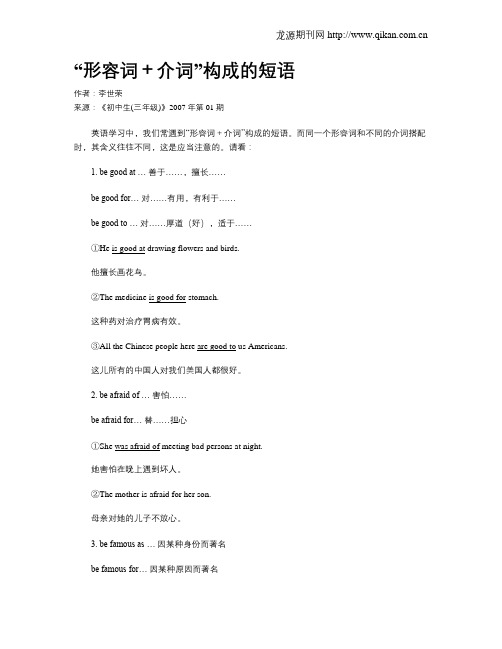
“形容词+介词”构成的短语作者:李世荣来源:《初中生(三年级)》2007年第01期英语学习中,我们常遇到“形容词+介词”构成的短语。
而同一个形容词和不同的介词搭配时,其含义往往不同,这是应当注意的。
请看:1. be good at … 善于……,擅长……be good for… 对……有用,有利于……be good to … 对……厚道(好),适于……①He is good at drawing flowers and birds.他擅长画花鸟。
②The medicine is good for stomach.这种药对治疗胃病有效。
③All the Chinese people here are good to us Americans.这儿所有的中国人对我们美国人都很好。
2. be afraid of … 害怕……be afraid for… 替……担心①She was afraid of meeting bad persons at night.她害怕在晚上遇到坏人。
②The mother is afraid for her son.母亲对她的儿子不放心。
3. be famous as … 因某种身份而著名be famous for… 因某种原因而著名be famous to… 对某些人来说有名气①His dad is famous as a doctor.作为一名医生,他的父亲很有名气。
②That nurse is famous for her kindness and carefulness.那位护士因为她的热心和细心而闻名。
③The Great Wall is famous to the people all over the world.对全世界的人来说长城很有名。
4. be late for… (干)……迟到了be late with… 做某事晚了①Why were you late for school yesterday?昨天你上学为什么迟到了?②My mother was late with dinner today.我妈妈今天做饭晚了。
中考英语be+形容词+介词短语总结

初中英语be+形容词+介词短语总结1.be+形容词+inbe concerned in 与……有牵连,对……负有责任He was concerned in the crime. 他与那起罪案有牵连。
More than one person has been concerned in this affair. 不止一个人与这件事有牵连。
be disappointed in 对……感到失望I’ve often been disappointed in love. 我经常情场失意。
I’m disappointed in you:I expected you to win. 你让我失望了,我本来指望你能赢的。
be dressed in 穿着The bride was dressed in white. 新娘穿一身白色的礼服。
She was dressed in orange pyjamas. 她穿着一身桔黄色的睡衣。
be engaged in 忙于He is engaged in official duties. 他忙于公务。
She is engaged in writing a novel. 她忙于写一部小说。
be experienced in 对……有经验的(有见识的)He’s experienced in looking after children. 他有照料孩子的经验。
She is not yet experienced in teaching. 她还没有教学经验。
be expert in 对……熟练的(有专门训练的)He is an expert in electronic engineering. 他是电子工程专家。
The Egyptians were especially expert in the working of stone. 古埃及人特别擅长于石工技艺。
be fortunate in 有……是幸运的;在……方面是幸运的He’s fortunate in his choice. 他做出这样的选择是幸运的。
初中英语93个“be...”短语分类汇总

初中英语93个“be...”短语分类汇总1、17个常用“be+形容词+about”结构be angry about 因某事而愤怒be anxious about 担忧;为……而忧虑be careful about 当心,注意be certain about 确信…be curious about 对…感到好奇be disappointed about 对…失望be excited about 对…感到兴奋;因…而激动be glad about 对…感到高兴be happy about 为…感到高兴be hopeful about 对…抱有希望be mad about 迷恋;对……狂热be nervous about 为…感到不安be particular about 讲究;对…挑剔be sad about 为…而难过be serious about 对…是认真的;认真对待be sure about 对…有把握;确信be worried about 为…而担心,忧虑2、18个常用“be+形容词+for”结构be anxious for 渴望;担忧be bad for 对…不利;对…有害be bound for 前往be celebrated for 因…而著名be convenient for 对…方便,在…附近be eager for 渴望be famous for 因…闻名be fit for 合适,适合be good for 对…有益(方便)be grateful for 对……心存感激be hungry for 渴望得到be late for 迟到be necessary for 对…有必要be ready for 为…准备好be sorry for 为…感到抱歉;为…感到难过be suitable for 对…合适(适宜)be thankful for 因…而感激be well-known for 以…出名3、6个常用“be+形容词+from”结构be absent from 缺席,不在be different from 与…不同be far from 离…远,远远不be free from 免受,免于;不受…影响的be safe from 免受…的伤害;不会遭到…的危险be tired from 因…而厌倦;因…而疲劳4、13个常用“be+形容词+in”结构be concerned in 与…有关be disappointed in 对(某人)感到失望be engaged in 从事于,忙于be experienced in 在…方面有经验be expert in 在…方面是行家be fortunate in 在…方面幸运be honest in 在…方面诚实be interested in 对…感兴趣be lack in 缺乏be rich in 富于,在…方面富有be skilful in 擅长于be successful in 在…方面成功be weak in 在…方面不行5、18个常用“be+形容词+of”结构be afraid of 害怕be ashamed of 为…感到羞愧be aware of 意识到,知道be capable of 能够,可以be careful of 小心,留心be certain of 确信,对…有把握be fond of 喜欢be free of 远离…;免于…be full of 充满be glad of 为…而高兴be nervous of 害怕be proud of 为…自豪be short of 缺乏……;离……不远be shy of 畏缩;羞于…be sick of 对…厌倦be sure of 肯定,有把握be tired of 对…厌烦be worthy of 值得;配得上的6、20个常用“be+形容词+to”结构be accustomed to 习惯于be blind to 对…是盲目的;对…视而不见;看不懂be close to 接近于…be cruel to 对…残酷,对…无情be devoted to 专心于/致力于…的;献身…的be equal to 相等;胜任;合适be familiar to 为…所熟悉;被某人熟悉be harmful to 对…有危害be important to 对…重要be open to 对…开放;愿接受…的be opposed to 反对…;与…相对be opposite to 与…相反;和…相对be polite to 对…有礼貌be related to 与…有关be respectful to 尊敬be rude to 对…无礼be similar to 与…相似be true to 忠实于;适用于;信守be used to 习惯于be useful to 对…有用7、16个常用“be+形容词+with”结构be angry with 对某人发脾气,生气be bored with 对…感到厌烦be busy with 忙于某事;忙着做…be careful with 小心be concerned with 关于,与…有关be content with 以…为满足be delighted with 对…感到高兴be disappointed with 对(某人)失望be familiar with 熟悉,精通be honest with 对(某人)真诚be ill with 患…病be patient with 对(某人)有耐心be pleased with 对…满意(高兴)be popular with 受…欢迎be satisfied with 对…满意be strict with 对(某人)严格。
【推荐】初中英语语法笔记,非常简明而全面

目录索引词法-冠词名词代词(所有格)介词(介词短语)形容词副词数词连词动词-非谓语动词情态动词系动词及物动词、不及物动词六大时态被动语态主谓一致there be句型句子-句子成分特殊疑问句反意疑问句祈使句感叹句时间状语从句系列状语从句宾语从句定语从句第一讲冠词一、冠词的分类1. 不定冠词:a/an 修饰可数名词单数2. 定冠词:the 修饰可数名词或不可数名词3. 零冠词:/ 修饰可数名词或不可数名词二、不定冠词的用法(表示泛指)1. 音素掌门:判断一个单词或字母前加a还是an, 首先需要判断它发音的第一个音素→若为元音音素,如a:, ei, 则用an →an unusual day an hour; an honest man, an American an egg,→若为辅音音素,如p, h, 则用a →a usual day; a European country, a one-eyed man,a broken egg,2. a/an 大法:U 型大法,是指 U 有两个音,发/ju:/时用 a,发/ʌ/时用 an。
eg. a UFO a uniform(制服) a usual man an unusual man an umbrella(雨伞)an ugly UFO a university(大学) an ugly dog a useful book:欧洲两怪,是指元音字母开头,但是发辅音。
eg. a one-year-old boy a European a one-eyed man a European country:隔山打牛。
”山”是指开头不发音字母 heg. an honest boy an hour a heavy box:吸星大法。
字母单独出现时的用法。
【第一个音素是辅音的字母】 a “C” in the word “CAT”【第一个音素是元音的字母】下面字母单独出现时只能用 aneg. an NBA player; an “f”in the word “friend”总结:(father 和 mother 能送来杏仁+a e i o)f h m n s l x r a e I o3.固定短语:1. It was getting late. She went back home ___B____. | 总结:A. in hurryB. in a hurryC. in the hurryD. in hurriesdo sth. | in a hurry 匆忙地做某事2. I am in trouble. Could you give me ___A____. |A. a handB. handsC. two handsD. hand | give sb. a hand帮助某人*可数名词以其中一个代表一类时(强调整体):A bird can fly。
初中英语“be+adj.+介词”短语大汇总

同一形容词+不同介词be famous/known for sth. 因……著名be famous/known as sb. 作为……而闻名▪be made from 由……制成(化学变化)be made of 由……制成(物理变化)▪be pleased to do sth. 乐意做某事be pleased with sb./sth. 对……感到满意▪be/ get ready for sth. 为……做准备be ready to do sth. 准备……▪be good/bad for sth. 对……有益/ 害be good/bad at (doing) sth. 擅长/不擅长……▪be strict on sth. 在某方面严格be strict with sb. 对某人要求严格▪be busy (in) doing sth. 忙于……be busy with sth. 忙于……▪be glad about/at/for sth. 因……而高兴be glad to do sth. 开心做……▪be afraid of (doing) sth. 害怕……be afraid to do sth. 不敢……▪be angry with sb. 生……的气be angry at sth. 因……而生气不同形容词+同一介词be +adj.+ of be careful of sth. 小心,注意……be certain/sure of sth. 对……有把握be fond of (doing) sth. 喜欢……be glad of sth. 为……而高兴be proud of sb. 以……感到自豪be ashamed of sb./ (doing)sth. 为……感到羞愧be afraid of (doing) sth. 害怕……be full of sth. 充满……be short of sth. 缺乏……be made of 由……制成(物理变化)be tired of (doing) sth. 对……厌倦be +adj.+ with be busy with sth. 忙于……be strict with sb. 对某人要求严格be pleased with sb./sth. 对……感到满意be patient with sb. 对……有耐心be filled with sth. 充满……be angry with sb. 生……的气be familiar with sb./ sth. 对……熟悉be popular with sb. 受……欢迎be born with sth. 天生具有……be covered with sth. 被……所覆盖be +adj. +to be friendly/kind/nice to sb. 对……友好be polite to sb. 对……有礼貌be rude to sb. 对……粗鲁be afraid to do sth. 不敢……be harmful to sb./ sth. 对……有危害be close to sth. / sb. 靠近……be pleased to do sth. 乐意……be ready to do sth. 准备……be glad to do sth. 开心做……be willing to do sth. 乐于……be sure to do sth. 一定会……be +adj. +for be famous/known for sth. 因……著名be/ get ready for sth. 为……做准备be good/bad for sth. 对……有益/ 害be responsible for sb./(doing) sth. 对……负责be sorry for sb./ sth. 对……遗憾,抱歉be late for (doing) sth. 迟到……be thirsty for sth. 渴求……be used for (doing) sth. 用于……be glad for sth. 因……而高兴be +adj.+inbe/become interested in (doing) sth. 对……感兴趣be successful in (doing) sth. 在……成功be rich in sth. 富含……,盛产be weak in (doing) sth. 在……方面薄弱be active in doing sth. 积极……be busy (in) doing sth. 忙于……be strict in (doing) sth. 对……要求严格be made in sw. 在……生产或制造do well in doing sth. 在……方面做得好,善于……be dressed in sth. 穿着……be +adj.+ aboutbe worried about sb./ sth. 对……感到担忧be sure about sth. 对……有把握be crazy about sb./ sth. 对……着迷be sorry about sth. 对……感到抱歉be strict about sth. 对……要求严格be excited about (doing) sth. 对……感到兴奋be pleased about sth. 因……感到高兴be glad about sth. 因……而高兴be nervous about (doing) sth. 因……而紧张be +adj.+ atbe good/ bad at (doing) sth. 擅长/不擅长……be angry at sth. 因……而生气be surprised at sb./ (doing) sth. 对……感到吃惊be amazed at sth. 对……感到惊讶be mad at sb. 生……的气be glad at sth. 因……而高兴be aimed at doing sth. 以……为目的be +adj.+ from be far from sw. 远离be separate from sb./sth. 与……分离be made from 由……制成(化学变化)be absent from sth. 缺席be different from sb./sth. 与……不同be +adj.+ on /as be strict on sth. 在某方面严格be hard on sb. 对……苛刻be famous/known as sb. 作为……而闻名。
初中英语语法知识点整理总结

初中英语语法知识点整理总结一、基本语法1.词性:名词、形容词、副词、动词、代词、冠词、介词、连词、数词、感叹词2.句子成分:主语、谓语、宾语、定语、状语、补语3.句子类型:陈述句、疑问句、祈使句、感叹句、条件句、比较句等二、句子结构1.简单句:由一个主语和一个谓语构成,表达一个完整的意思2.并列句:由两个或多个主句通过连词连接而成的句子3.复合句:由一个主句和一个或多个从句构成的句子4.宾语从句:作为主句的宾语的从句5.定语从句:修饰名词的从句6.状语从句:作为主句的状语的从句三、时态1.一般现在时:表示经常性的动作或事实2.现在进行时:表示现在正在进行的动作3.一般过去时:表示过去发生的动作或状态4.过去进行时:表示过去一些时间正在进行的动作5.现在完成时:表示过去的经验或动作对现在造成的影响6.过去完成时:表示过去一些时间或动作之前的完成动作四、语态1.被动语态:由动词的宾语和过去分词构成,强调动作的承受者而不是执行者2.主动语态:动词主语直接执行动作五、形容词和副词1.形容词修饰名词,副词修饰动词、形容词或副词2.形容词和副词的比较级和最高级3.形容词和副词的用法及修饰位置六、名词1.可数名词和不可数名词的区别及用法2.名词的单数和复数形式3.名词所有格的构成和用法七、代词1.人称代词、物主代词、反身代词、指示代词、不定代词等2.代词的主格和宾格形式3.代词的用法及位置八、冠词1.定冠词和不定冠词的区别及用法2.冠词的用法及位置九、动词1.动词的时态、语态、主动和被动形式2.动词的不同意思和用法3.动词的非谓语形式:不定式、现在分词、过去分词4.动词的用法和位置十、介词1.介词的基本用法和位置2.常用介词和短语的用法和搭配十一、连接词1.连词的分类及用法:并列连词、从属连词、关联连词等2.连词引导的从句的构成和用法以上是初中英语语法的一些基本知识点总结,希望能帮助到你。
记住这些基本知识点,然后通过大量的练习和阅读来巩固和运用,可以帮助你在英语学习中取得好的成绩。
初中语法大攻克--be+形容词+介词短语

Be + adj+prep英语学习中,我们常会遇到“be+形容词+介词短语”的结构。
现就初中英语课本中的这种结构作一归纳,供同学们复习使用。
一、be +adj+of1 be afraid of…(terrified of/ scared of/)I'm terrified of flying I'd rather go by sea.我害怕坐飞机--我宁愿坐船.2 be full of…3 be fond of…4 be proud of5 be tired ofShe is tired of doing her homework. 她对写作业感到很厌倦。
6 be sick ofI'm sick of waiting around like this. 我腻烦像这样在一旁等著。
It makes me sick to see her being treated so badly.我看到她受到这样虐待非常愤怒。
7 be sure ofBook early if you want to be sure of a seat.8 be certain of9 be short of10 be careful of…注意,留心Be careful of your health注意你的健康; 请多保重。
Be careful of the dog; it sometimes bites people.留心那条狗,有时候咬人。
11 be ashamed of…对... 感到羞耻He has done nothing to be ashamed of他从未做过亏心的事情。
As for you, you ought to be ashamed of yourself.至於你,你应该感到惭愧。
You should be ashamed of what you have done.你应为自己所做的事感到羞愧。
特级英语老师整理:“be + 形容词 + 介词”结构汇总

特级英语老师整理:“be + 形容词 + 介词”结构汇总学习英语,注重平时的单词、短语的积累,而对于短语,同学们就要做到能够有效地区分各个短语的意义,比如“be angry baout”与“be careful about”,两个短语,就中间一个单词不同,意义就大不相同,前者表示“因某事而愤怒”,后者表示“当心、注意”。
同学们如果将每一类短语整理、汇总,再来区分单个短语的意义,学习效率会提高很多。
一“be+形容词+from”结构be absent from 缺席He was often absent from classes, and failed his examinations.他经常缺课,所以没有通过考试。
be different from 与……不同My best friend Larry is quite different from me.我最好的朋友拉里与我很不一样。
be far from 离……远,远远不Success won't be far from you.成功不会远离你。
be free from 不受……影响的;摆脱了……的I was so happy to be freefrom the pain.我很高兴摆脱了疼痛。
be safe from 没有……的危险They aimed to make the country safefrom terrorist attacks.他们力图使国家免遭恐怖分子的袭击。
二“be+形容词+for”结构be bad for 对……有害,对……不利Very loud music can be bad for your ears.声音特别大的音乐会对耳朵有害。
be convenient for 对……方便Nowadays, it is convenient and cheap for us to ride a shared bike.如今,我们骑共享单车既方便又便宜。
初中be+形容词+介词短语总结

1 be able to 能够2 be friendly to 对……很友好3 be polite to sb 对某人有礼貌4 be friendly to sb 对某人友好5 be rude to sb 对某人粗鲁6 be close to 靠近,接近……7 be harmful to……对……有危害8 be similar to 与……相似9 be used to sth/doingsth习惯于……10 be useful to 对……有用11 be familiar to sb (某物)对于某人很熟悉12 be filled with……被……填满13 be satisfied with 对---感到满意14 be busy with 忙于做......15 be pleased with 对---感到高兴16 be familiar with sth (某人)对...... 熟悉17 be angry withsb 生某人的气18 be strict withsb对某人严格19 be worried about 对……感到担心20 be worried about 对……感到担心21 be excited about 对……感到兴奋22 be nervous about因---而紧张23 be anxious about为……担忧24 be far from 距离……远25 be different from与……不同26 be full of 充满……27 be proud of 对......自豪28 be careful of 当心,小心……29 be afraid of 害怕30 be tired of 对---感到厌倦31 be short of 对……短缺32 be sure of……对……有把握,肯定33 be tired of 对……感到厌烦34 be famous for 因......而著名35 be ready for 为....... 准备36 be good/bad for对……有益 /有害37 be late for 迟到38 be suitable for对……合适。
初中英语介词用法总结

初中英语介词用法总结介词(preposition):也叫前置词。
在英语里,它的搭配能力最强。
但不能单独做句子成分需要和名词或代词(或相当于名词的其他词类、短语及从句)构成介词短语,才能在句中充当成分。
介词是一种虚词,不能独立充当句子成分,需与动词、形容词和名词搭配,才能在句子中充当成分。
介词是用于名词或代词之前,表示词与词之间关系的词类,介词常与动词、形容词和名词搭配表示不同意义。
介词短语中介词后接名词、代词或可以替代名词的词(如:动名词v-ing).介词后的代词永远为宾格形式。
介词的种类:(1)简单介词:about, across, after, against, among, around, at, before, behind, below, beside, but, by, down, during, for, from, in, of, on, over, near, round, since, to, under,up, with等等。
(2)合成介词:inside, into, outside, throughout, upon, without, within(3)短语介词:according to, along with, apart from, because of, in front of, in spite of, instead of, owing to, up to, with reguard to(4)分词介词:considering, reguarding, including, concerning介词短语:构成介词+名词We go to school from Monday to Saturday.介词+代词Could you look for it instead of me?介词+动名词He insisted on staying home.介词+连接代/副词I was thinking of how we could get there.介词+不定式/从句He gives us some advice on how to finish it.介词的用法:一、介词to的常见用法1.动词+toa)动词+ toadjust to适应,attend to处理;照料,agree to赞同,amount to加起来达…,belong to属于,come to达到,drink to为…干杯,get to到达,happen to发生在某人身上,hold to紧握,lead to通向,listen to听,occur to想起,object to反对,point to指向,respond to回答,refer to参考;指的是…;涉及,reply to回答,see to负责,stick to坚持,turn to求助,write to给某人写信。
“be+形容词+介词短语”用法透视

“be+形容词+介词短语”用法透视
丁好鹏
【期刊名称】《中学英语园地:高三版》
【年(卷),期】2007(000)009
【摘要】<正>"be+形容词+介词短语"是中学英语中十分重要的结构,而且使用频率较高。
本文拟谈谈这一结构的用法。
一、"be+形容词+介词短语"结构的基本用法1.be interested in...意为"对……感兴趣"。
例如:
【总页数】7页(P21-27)
【作者】丁好鹏
【作者单位】江苏如皋市城南中学
【正文语种】中文
【中图分类】G634.41
【相关文献】
1.形容词用法透视 [J], 李福荣
2.形容词用法透视 [J], 李福荣
3.表示进行意义的“be+介词短语” [J], 吴桂兰;
4.浅析表示进行意义的“be+介词短语”结构 [J], 邓孟荣;
5.Be+某些介词短语、副词的时态及语态意义 [J], 王克昆
因版权原因,仅展示原文概要,查看原文内容请购买。
中考英语 be 形容词 介词 短语总结(on,to,for,from,at)
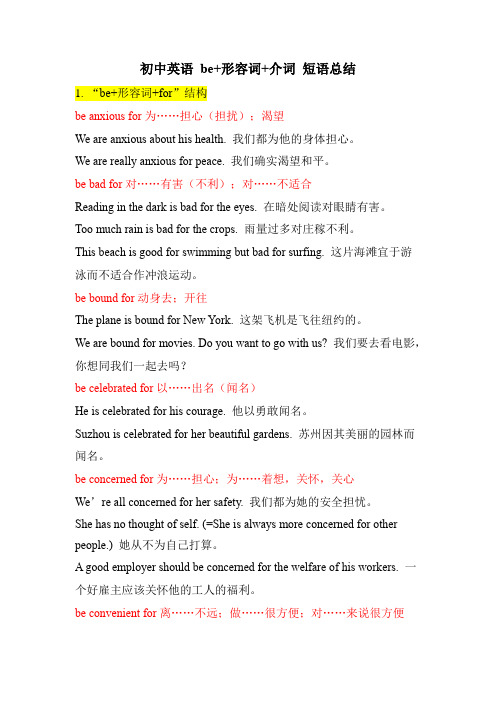
初中英语be+形容词+介词短语总结1.“be+形容词+for”结构be anxious for为……担心(担扰);渴望We are anxious about his health. 我们都为他的身体担心。
We are really anxious for peace. 我们确实渴望和平。
be bad for对……有害(不利);对……不适合Reading in the dark is bad for the eyes. 在暗处阅读对眼睛有害。
Too much rain is bad for the crops. 雨量过多对庄稼不利。
This beach is good for swimming but bad for surfing. 这片海滩宜于游泳而不适合作冲浪运动。
be bound for动身去;开往The plane is bound for New York. 这架飞机是飞往纽约的。
We are bound for movies. Do you want to go with us? 我们要去看电影,你想同我们一起去吗?be celebrated for以……出名(闻名)He is celebrated for his courage. 他以勇敢闻名。
Suzhou is celebrated for her beautiful gardens. 苏州因其美丽的园林而闻名。
be concerned for为……担心;为……着想,关怀,关心We’re all concerned for her safety. 我们都为她的安全担忧。
She has no thought of self. (=She is always more concerned for other people.) 她从不为自己打算。
A good employer should be concerned for the welfare of his workers. 一个好雇主应该关怀他的工人的福利。
初中英语形容词短语用法

初中英语形容词短语用法在初中英语的学习中,形容词短语是一个重要的知识点。
掌握好形容词短语的用法,对于提高英语语言表达的准确性和丰富性有着重要的意义。
形容词短语,简单来说,就是由形容词和其他词(如介词、副词等)一起构成的短语,用来修饰名词或代词。
比如,“be afraid of”(害怕),“be fond of”(喜欢),“be good at”(擅长)等等。
先来看“be afraid of”这个短语。
“afraid”是形容词,意思是“害怕的;畏惧的”,“of”是介词。
“be afraid of sth /doing sth”表示“害怕某物/做某事”。
例如:“I'm afraid of dogs”(我害怕狗。
)“She is afraid of going out alone at night”(她害怕晚上独自外出。
)“be fond of”这个短语,“fond”是形容词,“of”是介词。
“be fond of”意思是“喜欢;喜爱”,其后接名词、代词或动词的 ing 形式。
例如:“He is fond of music”(他喜欢音乐。
)“My sister is fond of reading novels”(我妹妹喜欢读小说。
)“be good at”也是我们经常会用到的一个形容词短语。
“good”是形容词,“at”是介词。
“be good at”表示“擅长;在方面做得好”,其后通常接名词、代词或动词的 ing 形式。
比如:“Li Ming is good at English”(李明擅长英语。
)“They are good at playing basketball”(他们擅长打篮球。
)形容词短语在句子中通常作定语、表语或宾语补足语。
作定语时,形容词短语放在所修饰的名词之后。
例如:“Th e boy afraid of darkness is my younger brother”(那个怕黑的男孩是我的弟弟。
初中英语 人教中考Be动词+形容词+介词的短语

一、be +adj+of1. be afraid of…(terrified of/ scaredof/)害怕···2. be full of…充满···3. be fond of…喜欢···4. be proud of对···自豪5. be tired of厌恶···6. be sick of对···厌烦7.be sure of确信做··8. be certain of确信9. be short of缺乏···10. be careful of…注意,留心11. be ashamed of…对 ...感到羞耻12.be aware of…意识到13. be confident of…信 ...,确信 ...14. be worthy of值得···二、Be +adj + with1. be popular with受…欢迎的2. be angry with生......的气 = be annoyed with3. be busy with 忙于做…4. be filled with 充满5. be pleased with对··满意6. be disappointed with对···失望7. be strict with 对···严格8. be satisfied with对···满意9. be happy with 对···高兴10. be patient with对…有耐心11. be covered with被··覆盖12. be concerned with牵涉到,与 ...有关,参与,挂念,担心三、be + adj + about1.be sorry about对··遗憾2.be sure about 确保··3. be worried about= be anxious about 对··焦虑4. be curious about…对 ...好奇5. be nervous about对···紧张四、be + adj + at1. be good / bad at… 不擅长···2. be surprised at 对···惊讶3. be amazed at…对.......感到惊讶4.be sorry at 对···抱歉5. be mad at…对…非常恼火6 be angry at因......生气= be annoyed at五、be + adj + for1 be late for 迟到···2 be good / bad for 对···有好处/坏处3 be / get ready for准备好··4 be / feel sorry for对··抱歉5 be known for“因......而著名”be known as:意为“作为......而著名”,be known to: “为......所了解/知道”,He is known to all in our village.be known in:意为“在某地很著名”。
初中英语词性总结(介词,名词,冠词,动词)
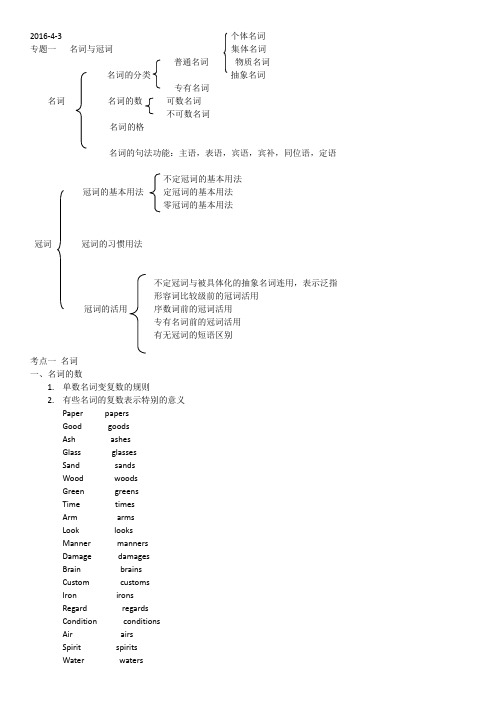
2016-4-3 个体名词专题一名词与冠词集体名词普通名词物质名词名词的分类抽象名词专有名词名词名词的数可数名词不可数名词名词的格名词的句法功能:主语,表语,宾语,宾补,同位语,定语不定冠词的基本用法冠词的基本用法定冠词的基本用法零冠词的基本用法冠词冠词的习惯用法不定冠词与被具体化的抽象名词连用,表示泛指形容词比较级前的冠词活用冠词的活用序数词前的冠词活用专有名词前的冠词活用有无冠词的短语区别考点一名词一、名词的数1.单数名词变复数的规则2.有些名词的复数表示特别的意义Paper papersGood goodsAsh ashesGlass glassesSand sandsWood woodsGreen greensTime timesArm armsLook looksManner mannersDamage damagesBrain brainsCustom customsIron ironsRegard regardsCondition conditionsAir airsSpirit spiritsWater waters3.单复数同行的名词二、名词的格1.‘s2.Of所有格3.双重所有格三、名词作定语四、几组常考名词辨析1.Cause ,reason,excuseCause 是造成一种事实或现象的“原因、起因”,后接介词of;Reason是说明一种看法或行为的“理由”;Excuse意味“借口、辩解”2.Mistake, error, fault, weaknessMistake判断理解方面的错误,由于缺乏思考造成的错误;(mistake几乎等于error,error更正式)Error可指人任何错误;Fault侧重于造成错误的个人责任,还可指人或物的缺点;Weakness尤指性格的弱点或缺点。
3.Journey, trip, travel, voyageJourney 适用范围广,可指陆海空的旅行,常指远距离的旅行。
牛津译林英语初中三年(七年级——九年级)语法知识总结
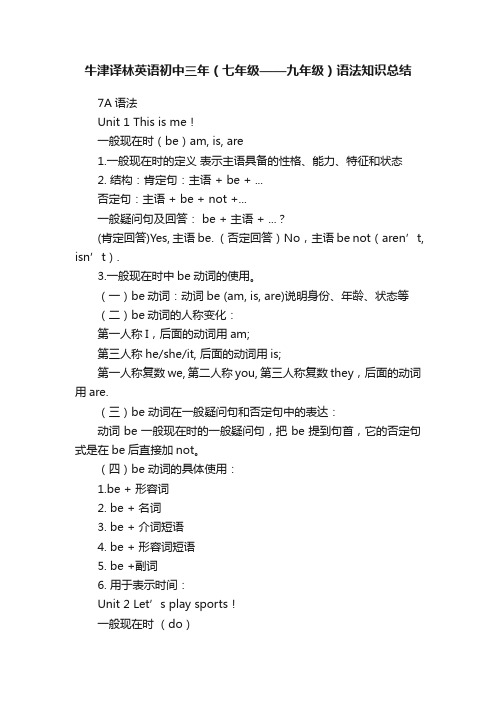
牛津译林英语初中三年(七年级——九年级)语法知识总结7A语法Unit 1 This is me!一般现在时(be)am, is, are1.一般现在时的定义表示主语具备的性格、能力、特征和状态2. 结构:肯定句:主语 + be + ...否定句:主语 + be + not +...一般疑问句及回答: be + 主语 + ...?(肯定回答)Yes, 主语 be. (否定回答)No,主语 be not(aren’t, isn’t).3.一般现在时中be动词的使用。
(一)be动词:动词be (am, is, are)说明身份、年龄、状态等(二)be动词的人称变化:第一人称I,后面的动词用am;第三人称he/she/it, 后面的动词用is;第一人称复数we, 第二人称you, 第三人称复数they,后面的动词用are.(三)be 动词在一般疑问句和否定句中的表达:动词be一般现在时的一般疑问句,把be提到句首,它的否定句式是在be后直接加not。
(四)be 动词的具体使用:1.be + 形容词2. be + 名词3. be + 介词短语4. be + 形容词短语5. be +副词6. 用于表示时间:Unit 2 Let’s play sports!一般现在时(do)1. 定义:表示经常的或习惯性的动作;表示客观真理或事实;表示目前的爱好、能力。
2. 常见时间短语:often, sometimes, usually, always, every week, on Sundays, once a month 等3. 结构:肯定句:主语 +V. + ...否定句:主语 + do/ does+ not + V. +...一般疑问句及回答: Do/Does + 主语 + ...?(肯定回答)Yes, 主语 do/ does. (否定回答)No,主语 do/does not(don’t, doesn’t).4. 第三人称单数形式及其变化规则当主语是第三人称单数时,谓语动词要用第三人称单数形式(三单)动词变化规则:(1).规则动词 + s,如makes, eats(2).s,sh,ch, ss, x 结尾 + es,如teaches, misses, fixes, finishes(3).辅音字母 + y结尾,把y 改为 ies,如carries, cries(4).特殊变化,如go--- goes, do --- does, have--- hasUnit 3 Welcome to our school!人称代词1. 定义:代替人或物的名词2. 人称代词的主宾格在句子中做的成分(1)人称代词的主格在句子中做主语,一般位于句首。
- 1、下载文档前请自行甄别文档内容的完整性,平台不提供额外的编辑、内容补充、找答案等附加服务。
- 2、"仅部分预览"的文档,不可在线预览部分如存在完整性等问题,可反馈申请退款(可完整预览的文档不适用该条件!)。
- 3、如文档侵犯您的权益,请联系客服反馈,我们会尽快为您处理(人工客服工作时间:9:00-18:30)。
初中Be+形容词+介词短语总结
1 be able to 能够
2 be friendly to 对……很友好
3 be polite to sb 对某人有礼貌
4 be friendly to sb 对某人友好
5 be rude to sb 对某人粗鲁
6 be close to 靠近,接近……
7 be harmful to……
对……有危害
8 be similar to 与……相似
9 be used to sth/doingsth
习惯于……
10 be useful to 对……有用
11 be familiar to sb
(某物)对于某人很熟悉
12 be filled with……
被……填满
13 be satisfied with
对---感到满意
14 be busy with 忙于做......
15 be pleased with
对---感到高兴
16 be familiar with sth
(某人)对...... 熟悉
17 be angry withsb 生某人的气
18 be strict withsb对某人严格
19 be worried about 对……感
到担心
20 be worried about 对……感到担心
21 be excited about 对……感到兴奋
22 be nervous about
因---而紧张23 be anxious about为……担忧
24 be far from 距离……远
25 be different from
与……不同
26 be full of 充满……
27 be proud of 对......自豪
28 be careful of 当心,小心……
29 be afraid of 害怕
30 be tired of 对---感到厌倦
31 be short of 对……短缺
32 be sure of……对……有把握,
肯定
33 be tired of 对……感到厌烦
34 be famous for 因......而著名
35 be ready for 为....... 准备
36 be good/bad for
对……有益/有害
37 be late for 迟到
38 be suitable for
对……合适。
适宜
39 be weak in 在.....方面不行
40 be interested in
对……感兴趣
41 be successful in 在……成功
42 be angry at /about sth
对......感到生气
43 be good/bad at 擅长
44 be mad at sb生某人的气
45 be surpriesd at
对……感到吃惊
46 be excited at
对……感到兴奋。
